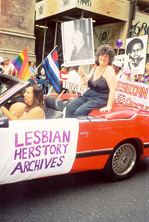
| JoanNestle.com | | | Foyer | | | Dining Room | | | Living Room | | | Bedroom & Study | | | Di’s Lounge | | | Garden | | | Blog | | | Urgent |
from A Restricted Country (1987)

History, like so many other things, has been redefined in the past two decades. More and more we are learning to listen to the individual and collective voices of the people who were once seen only as the victims of history, or as the backdrop for the drama of the rich, the powerful, the heads and tails of state. Like painted trees in robust operas, the baker and the housewife, the whore and the clerk just stood there while Kings and Queens sang their dreams and dirges around them. Now we have grassroots history projects documenting a vast range of human life, and I have been lucky enough to be a participant in one of these projects—
I would like this book to be read as history, these stories and essays to be documents of a flesh and a spirit that lived through and were changed by their times: the McCarthy fifties, the activist sixties, the institution-building of the seventies, and the renewed social struggle of the eighties. These times leave their mark both on the body and the imagination, but it is the body that has been most often cheated out of its own historical language, the body that so often appears as the ahistorical force that we simply carry with us until, for those of us born healthy, it tumbles us to the earth of restricted movement.
But my body made my history—
The women’s movement understood the need for a profound breaking of boundaries when it embraced the slogan “the personal is political.” I would like to carry it one step further: if the personal is political, the more personal is historical. The more personal demands attention be paid to how we fill our days and nights as we participate in any given economic system, how our flesh survives under different political systems, how we humanize gender tyranny, how we experience womanness and maleness in all the superstructures of class and race.
Erotic writing is as much a documentary as any biographical display. Fantasies, the markings of the erotic imagination, fill in the earth beneath the movement of great social forces: they tell deep tales of endurance and reclamation. They are a people’s most private historic territories. This is why I always wince when a gay activist says we are more than our sexuality or when Lesbian culture celebrants downplay lust and desire, seduction and fulfillment. If we are the people who call down history from its heights in marble assembly halls, if we put desire into history, if we document how a collective erotic imagination questions and modifies monolithic societal structures like gender, if we change the notion of woman as self-chosen victim by our public stances and private styles, then surely no apologies are due. Being a sexual people is our gift to the world.
I, and many others like me, were never the leaders of major events or the presidents of national organizations. We filled the ranks, walked the streets, answered the phones, did the mailings, but it was the collective history of our bodies’ desire that helped forge the changes to come. When I joined in founding the Lesbian Herstory Archives, it was not because I wanted power or money or fame, but because all the experiences of my different identities led me there: my Jewish self that knew memory was a holy thing, never to be bartered or sold; my old femme self that knew the sacredness of a scorned courage; my new feminist self that wanted the delight of a woman-only creation; my socialist self that believed all resources must be shared; my teacher self that had been taught by First World students the burden of colonization and the pain of exile; my psychological self that called on me to carry my mother and her loneliness into my own conflicts about security and freedom. And, like a hemp rope binding the parts together, ran my sexual self, taking on all these forms of being and rearranging them in stunning new ways. Out of this came the Lesbian Herstory Archives and this book.
On July 1, 1986, the Reagan Supreme Court, also invoking history, empowered the states to put Lesbians and gay men in jail for making love in the privacy of their homes. I mourn this use of history, this resurrection of ancient bigotry, to give life to contemporary fear and hatred of us. History, that huge conglomeration of people and events, is a tricky thing to invoke. Often one people’s history is another people’s hell. One cannot have unquestioning faith in history; it is, as the Italian philosopher said, a paradoxical force rather than a progressive one. We choose the history that we say is ours and by so doing, we write the character of our people in time.
On June 29, 1986, we marched in New York to proclaim our gay pride. One of the chants we chose to throw into the summer air was, “From Stonewall to Soweto, the people are resisting.” Let this be the history we make ours.
Joan Nestle
December 1986
New York City
© 1987 Joan Nestle. You may purchase A Restricted Country at Amazon.com or from your local women’s or queer bookshop.
Please contact the WebMs.